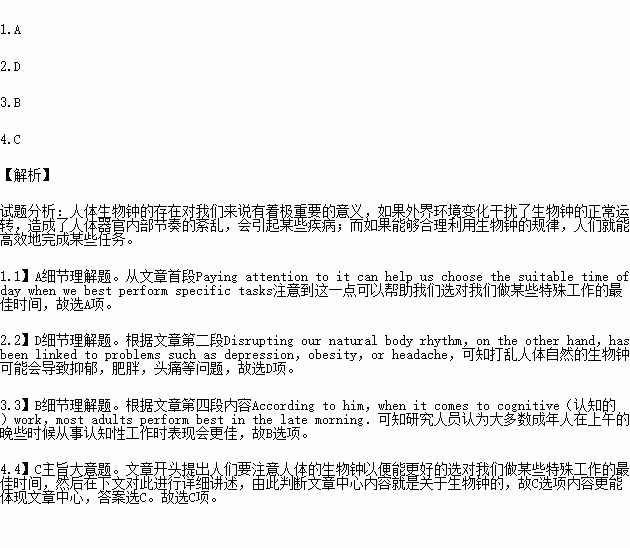题目内容
Our body clock, or natural body rhythm, influences our energy and alertness. Paying attention to it can help us choose the suitable time of the day when we best perform specific tasks.
The reality, however, is that most of us organize the time around work demands, school deadlines, commuting or social events. Doing whatever the body feels like doing is a luxury in today’s fast-paced modern society.
But that doesn’t mean it isn’t worth trying. Obeying our body clock has significant health benefits. Disrupting our natural body rhythm, on the other hand, has been linked to problems such as depression, obesity, or headache, says Steve Key, a biology professor.
When the body clock can synchronize (使……同步) the rhythms of its natural processes, it “gives us an advantage in daily life”, says Key.
According to him, when it comes to cognitive (认知的) work, most adults perform best in the late morning. As our body temperature starts to rise just before awakening in the morning and continues to increase until midday, our memory, alertness and concentration gradually improve.
However, he adds, our ability to concentrate typically starts to decrease soon thereafter. Most of us are more easily distracted (分心) between noon and 4 pm.
Alertness also tends to fall after eating a meal and sleepiness tends to peak around 2 pm, making that a good time for a nap.
Surprisingly, tiredness may increase our creative powers. For most adults, problems that require open-ended thinking are often best dealt with in the evening when they are tired, according to a study in the journal Thinking & Reasoning.
When choosing a time of the day to exercise, paying attention to your body clock can improve results. Physical performance is usually best from about 3 to 6 pm, says Michael Smolensky, a professor of biomedical engineering.
Of course, not everyone’s body clock is the same, making it even harder to synchronize natural rhythms with daily plans.
1.If we know our natural body rhythm well, we can ______.
A. find out the suitable time to do specific tasks
B. organize our time around work demands
C. do whatever our body feels like doing
D. be sure to be healthy
2.Which of the following is NOT true?
A. Our alertness is influenced by our natural body rhythm.
B. Doing whatever your body feels like is very difficult in our modern society.
C. Obeying our body clock is good for our health.
D. Disrupting our natural body rhythm must lead to obesity.
3.Inspiration (灵感) to solve a difficult problem will most probably come to us
______.
A. when we get up in the morning
B. when we are tired in the evening
C. when we are full of energy in the late morning
D. when we are asleep at night
4.Which of the following can be the suitable title for the passage?
A. What is natural body rhythm?
B. Natural body rhythm is good for us.
C. Something about natural body rhythm.
D. The latest research about natural body rhythm.
 优等生题库系列答案
优等生题库系列答案 53天天练系列答案
53天天练系列答案

 ),并在其下面写出该加的词。
),并在其下面写出该加的词。 hand in the application form before 12 noon on May 12th 2014
hand in the application form before 12 noon on May 12th 2014